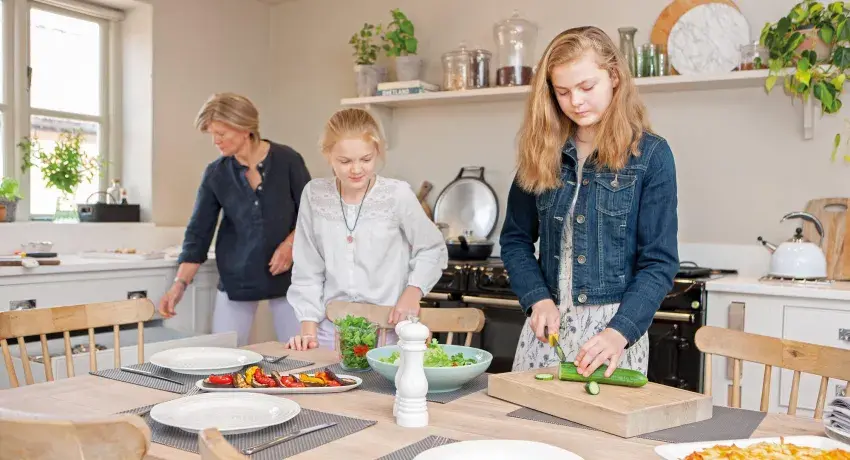As part of our 100th birthday celebrations, we’re looking at a series of trends that will take us through the next decade. From chefs to watch to interiors trends, we’ll look at how life will change. We’re starting here with ten food trends and looking at what and how we’ll be eating over the coming decade…
1. Home cooking
A recent survey by Waitrose found the pandemic fundamentally changed our outlook on cooking, with six in 10 of those questioned now taking more pride in cooking than they did pre-Covid, and four in 10 saying food is more important than it was before. One in five people bought a barbecue during lockdown and one in 10 installed an outdoor bar. This new-found interest in home (and garden) cooking is set to continue, with many people citing a desire to entertain at home rather than go out. We’ll invest in quality food and kit and experiment with different cooking styles and new foods
2. Umami
Supermarket predictions for food trends for 2022 have named umami as top of the list. The word was coined in 1908 by Japanese chemist Kikunae Ikeda, and essentially means that sort of savouriness you need more of. It’s a taste rather than a food, the fifth taste after sweet, sour, bitter and salty. Even though it’s tricky to encapsulate, it’s a trend set to become mainstream and endure throughout the decade.
3. Reducetarianism
While some have switched to an entirely plant-based diet, it’s predicted that others will become reducetarians. Loosely put, it means we’ll either consciously or unconsciously reduce our consumption of meat and dairy products. Advocates, including RSPCA Assured, say it’s good for our health, the environment and British farmers, helping them meet higher welfare standards.
4. Functional foods
The pandemic has fundamentally changed our relationship with food and, rather than being a passing fad, foods that deliver wellbeing benefits are set to become an enduring trend. People are increasingly looking for functional foods that meet their particular needs, be they boosting immunity, aiding sleep or aging healthily.
5. Conscious consumption
Our concerns about the environment are shaping how we eat as our food choices can make a huge difference to climate change and biodiversity. Research from YouGov shows as many as one in five Millennials have changed their diet to reduce their environmental footprint. Whether it’s cutting out meat, insisting on minimal packaging, or buying local, we’re going to be making more and more choices that benefit the planet.
6. Nostalgia
When life is hard, it makes sense that we hanker after less complicated times and that often means harking back to childhood. That is, perhaps, what is driving the nostalgia trend in food. Waitrose saw sales of rice pudding increase 67% on pre-lockdown times and shoppers at Marks & Spencer have been rushing to snap up Birds Custard Powder, with sales having increased 187%. It looks as if these trends are here to stay with people continuing to look for treats that are both comforting and nostalgic.
7. Vegan butchers
Vegan butchers are starting to pop up on British high streets and some supermarkets are even trialling vegan butcher counters. This is a smart move as a report from the Smart Protein Project stated that sales of plant-based meat increased 63% between 2018 and 2020. It’s a trend that’s here to stay and we want more than frozen vegan burgers stuck at the back of a freezer in the supermarket. Beautifully laid out butcher’s counters, with creative and considered offerings, are going to be at the heart of plant-based eating in the coming decade.
8. Home baking
Lockdowns saw us whipping up banana bread and nurturing sourdough starters as if our lives depended on it, but as we emerge from the pandemic our interest in baking isn’t waning. Instead, we’re getting more creative. Our love of baking shows, such as The Great British Bake Off, Sugar Rush and Baking Impossible means we’re creating confections that look as amazing as they taste. Pinterest is forecasting ‘gravity defying cake ideas’ as a big trend for 2022 and we’re sure to be whipping up the odd Victoria sponge for our jubilee street parties too. The interesting thing about the home baking trend is how neatly it fits with other long-term trends. We can customise cakes to be free from ingredients we don’t wish to consume and can ensure those we do buy are from ethical sources.
9. Personalised diets
What if you could eat a diet tailored personally for you? There are companies that can create metabolic challenges to see how your body reacts to certain foods. By giving you something to eat with specific known nutrients and taking blood tests before and after they will be able to analyse which foods work for you. Andy Narotsky, a product development scientist at Campbell’s Soup Company has said this information could be used to develop eating ‘profiles’, then companies such as Campbell’s could label foods according to which profile the levels of protein, carbohydrates, and fats work best with.
10. Hibiscus
Whether it’s in a cookie, a beverage or a savoury dish, the beautiful hibiscus flower is about to have its moment. Whether it will endure for an entire decade remains to be seen, but certainly for the next few years we’ll be hearing a lot about it and hopefully seeing it on our plates too. Whole Foods is tipping it as a hot trend for this year and manufacturers are adding it to fruit spreads and yoghurts. It’s high in vitamin C and in West Africa it’s made into a delicious tea called bissap or zobo.










